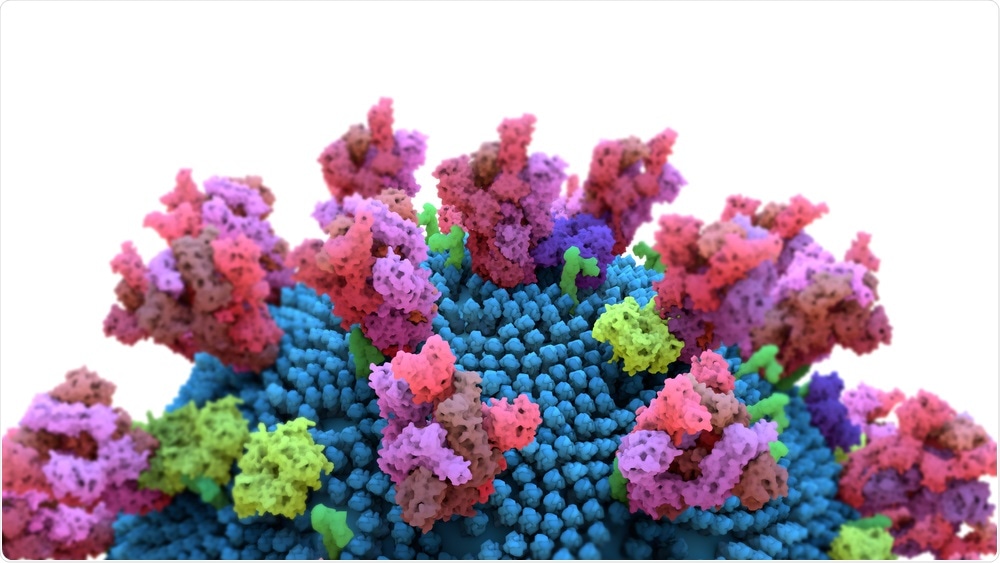The constantly evolving SARS-CoV-2 virus, the causative agent of COVID-19, creates anticipation among immunologists and infectious diseases experts to know if the new variants are resistant to the human antibodies that recognized initial versions of the virus.

SARS-CoV-2 Spike Protein. Image Credit: Design_Cells/Shutterstock.com
The COVID-19 vaccines are created on the basis of the genetic code and chemistry of the initial virus may provide less protection if the antibodies they help people produce do not keep off novel viral strains.
Recently, scientists from Brigham and Women’s Hospital and their associates created an “atlas” that charts how 152 different antibodies attack a major piece of the SARS-CoV-2 machinery, the spike protein, as it has evolved since 2020.
The research was published in the journal Cell. The study highlights antibodies capable of neutralizing the newer strains while identifying regions of the spike protein that have become more resistant to attack.
Emerging data show that vaccines still confer some protection from new SARS-CoV-2 variants, and our study shows how that works from an antibody standpoint. These data can help us think about what the best kind of booster vaccine might be by studying how the repertoire of human antibodies recognizes the spike protein.”
Duane Wesemann, MD and PhD, Study Corresponding Author, Division of Allergy and Clinical Immunology and Division of Genetics, Brigham and Women’s Hospital
Wesemann is also an associate professor at Harvard Medical School. The scientists investigated the antibody-producing Memory B cells of 19 patients who were infected with SARS-CoV-2 in March 2020, before the emergence of new variants.
They analyzed these antibodies and other antibodies characterized by researchers on how they bind to the spike protein models of the B.1.1.7 (Alpha), B.1351 (Beta), and P.1 (Gamma) variants of SARS-CoV-2, which were identified first in the United Kingdom, South Africa, and Brazil, respectively. An analysis of the Delta variant is currently underway.
Comprehensively, the researchers ascertained that the hundreds of antibodies they analyzed largely bind to seven major “footprints” on the spike protein. Even when many of these antibodies “compete” to bind to the same regions of the early version of the SARS-CoV-2 spike protein, on newer strains, some of these antibodies lose their potency while others come out as broadly responsive neutralizers.
Specifically, antibodies binding to two of these spike protein regions, dubbed RBD-2 and NTD-1, are highly potent neutralizers of initial forms of the spike protein. The B.1.351 spike variant showed the greatest ability to evade existing antibody arsenals, escaping many RBD-2- and NTD-1-binding antibodies.
Certain antibodies binding to another region, named S2-1, can recognize spike proteins from more distantly related viruses like SARS, MERS, and common cold coronaviruses.
Making different antibodies that compete for one region of the virus allows the immune system to be more flexible. Otherwise-redundant recognition by antibodies targeting the same footprint of one version of the virus confers recognition depth of the same footprint on variants, and some antibodies maintain high neutralization potency against all the variants.”
Duane Wesemann, MD and PhD, Study Corresponding Author, Division of Allergy and Clinical Immunology and Division of Genetics, Brigham and Women’s Hospital
“Now that we can identify the antibodies that are more broadly reactive to all of the variants, we can think about how to elicit them more strongly in a vaccine,” added Wesemann.
Source:
Journal reference:
Tong, P., et al. (2021) Memory B Cell Repertoire for Recognition of Evolving SARS-CoV-2 Spike. Cell. doi.org/10.1016/j.cell.2021.07.025.